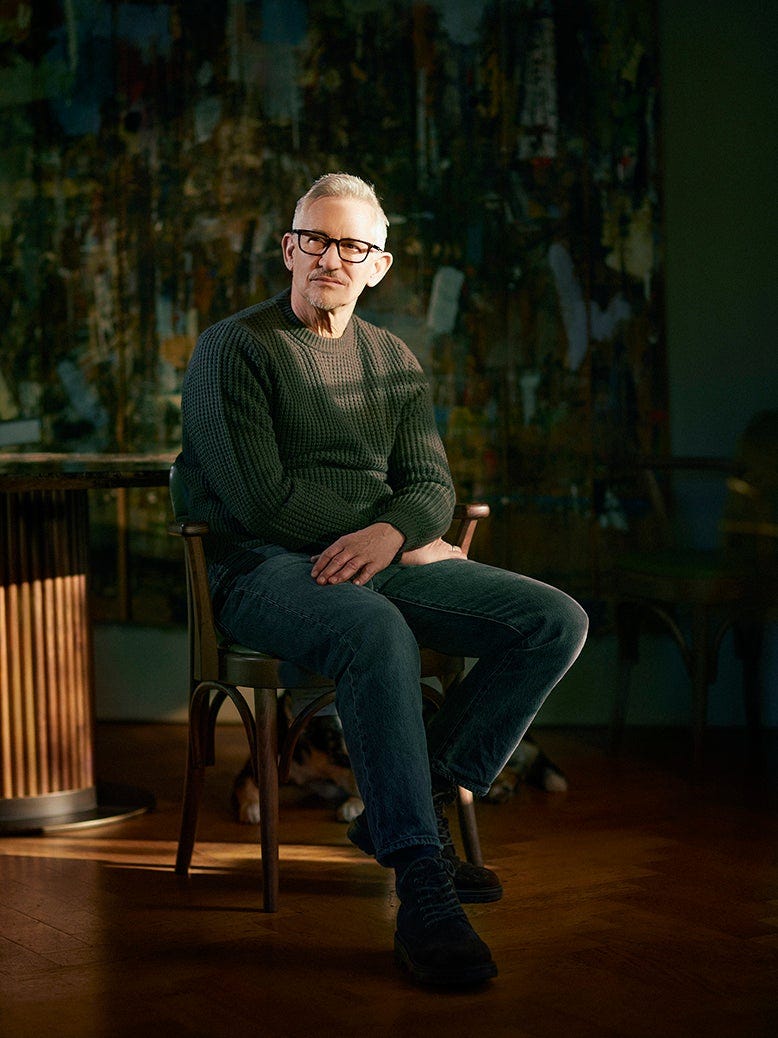The Saturday Read: Christmas Special Part I
Inside: Jason Cowley meets Gary Lineker, Paddington's imperium, France in crisis, Gregg Wallace, Didion vs Babitz, and Jeremy Bowen on Jerusalem.
Good morning. Welcome to the Saturday Read, the New Statesman’s guide to politics, culture, books, and ideas. This is Finn, together with Nicholas, Pippa and George.
Every year has its main characters, and as 2024 winds down we have been wondering who has made the strongest impression on these pages. Starmer, Lammy, Reeves – all the usual suspects. But the American election propelled Donald Trump, Elon Musk and JD Vance into the stratosphere. Next year we might suspect their coterie of advisors – core constituents in the new American right – to become familiar. Thankfully we have Freddie and Katie in Washington DC to decipher their politics and motivations for us. Until then, the president-elect graces the cover of our Christmas Special, released this week.
Kamala Harris’s star, meanwhile, has fallen. The bad candidate with “a rictus smile”, as per Jason’s description, is heading for footnote of history territory, consigned to the answer sheet of a rather tricky pub quiz question: “Who ran against Donald Trump in 2024” may be as hard to answer in a decade’s time as “Who was prime minister when Queen Elizabeth II died”. Not everyone’s fame is built to last.
But, closer to home is someone with an uncanny ability to maintain stardom: now-A list politician Nigel Farage. The New Statesman has prodded and analysed his Reform Party all year – Jason interviewed Farage in Clacton ahead of the election and Nicholas headed to the Reform conference just afterwards. Jeremy Clarkson has unexpectedly become a 2024 main character, too – he is blessed with the activist’s knack and could probably lead a flat-capped, Barbour-jacketed populist revolt if he wanted to.
But amid all of these – not to mention our most-regularly featured writers, John Gray, Michael Prodger and Megan Nolan among others – we would be remiss to forget Charli XCX. The young-girl-from-Essex turned pop icon captured the hearts, minds and keyboards of Saturday Read contributors, even if Brat is battle-worn with cliché already.
The picks…
Good morning, Nicholas here. We lead this week with Jason’s final piece as New Statesman editor, his interview with Gary Lineker. Jason has profiled prime ministers, philosophers and populist upstarts over the past 16 years, but Lineker is harder to categorise, making headlines not for his right foot so much as his right-thinking social media presence and podcast empire. Jason sketches the personal, political and everything in between. Elsewhere, we have the great American essayist Christopher Caldwell, the BBC’s international editor Jeremy Bowen and our in-house literary critic Anna Leszkiewicz. Thanks for reading and have a great weekend.
1—“No wonder people despise him”
Gary Lineker’s epic career has been a question of extraordinary shapeshifting: from footballer, to presenter, to self-appointed political pundit to media mogul. What’s it like to be him? Jason Cowley visited his house to find out. NH
What Lineker appreciates most about modern football is what he considers to be its inclusivity. He does not deny racism exists in the game and he is not naively idealistic but, he says, “Look inside the dressing rooms: black guy, white guy, Asian, Muslim, Catholic – they all get on beautifully, because we’re humans. But we’re kind of forced to be against each other.” Inadvertently he had moved seamlessly back to cultural politics or what he prefers to call humanitarian concerns, a constant preoccupation.
2—“The second age of Trump”
In recent decades, Christopher Caldwell explains, the politics of the United States flipped: the Democrats became the party of establishment wealth while the Republicans became the party of workers and peace. Christopher provides sobering analysis on what it all means. NH
The result was revolutionary, and not in the way Democrats intended: anyone with a sense of fair play would be tempted to vote for a fellow who had been, as the playwright David Mamet put it, “raided, indicted, convicted, sued, slandered and shot”. But at this point, to do so would be to declare the judicial system corrupt. In the end, half the country did just that: suburbanites wore T-shirts with Trump’s mug shot on them. Grannies danced giddily on TikTok: “Here’s how it feels to vote for a convicted felon!” The country is floating free of its laws. That is what gives the present its feeling of open-ended promise and peril.
3—“The biggest bear in business”
How did a polite, loquacious and anthropomorphic bear from Peru become a symbol of Britishness? Amelia Tait investigates the Paddington phenomenon. Behind the cuddly and “brainless” persona, she found a ruthless ursine empire. FMcR
Paddington Bear began life in the shops. On Christmas Eve 1956, a Berkshire-born, 30-year-old BBC cameraman named Michael Bond saw a small teddy sitting alone on a shelf at Selfridges, looking “rather sorry for himself”. Bond bought the bear for his wife and, months later, started writing a story about it “in order to get my brain working that morning”. Paddington was so named because Bond lived near the station; the iconic brown label around his neck (“Please look after this bear. Thank you”) was inspired by news footage of evacuees Bond had seen during the war. “Paddington’s old hat and his duffle coat were simply replicas of what I happened to be wearing at the time,” Bond wrote in a 1996 autobiography, Bears & Forebears: A Life So Far.
4—“Nervous financial markets”
The EU has changed far more than Britain, Wolfgang writes. The bloc has become a lesser force, its legislation missing the finesse of British master-drafters. Against this fragility, a budget crisis threatens France – and the EU has not recovered from the last time it had to intervene to resolve a sovereign debt crisis. PB
I struggle to imagine the UK, especially under the previous government, would have assented to the EU’s anti-digital laws – the AI-regulation, the crypto-regulation, the Digital Markets Act, or the Digital Services Act. These laws are not only destructive in their own right, but they also run counter to the time-honoured regulatory principle of dealing with problems after they arise. Europeans invented the car before they drew up a highway code. But the post-Brexit EU is doing it the other way round. There are hardly any AI or crypto companies in Europe, and yet the EU thinks it can regulate the global tech industry.
5—“English surrealism”
Tirzah Garwood – as the wife of the more famous painter Eric Ravilious – was often confined to the background. But at an exhibition of her own work at Dulwich Picture Gallery, Michael found an artist in possession of charm and depth. GM
This concern with all-over pattern, a product of her wood engravings, is there too in a wonderful monotone ink and wash picture of a snow woman, made in 1938 when Tirzah and Eric had moved to nearby Castle Hedingham. It shows their back garden with the silhouette of the castle over the wall, flakes falling and footprints in the snow. There is a hint, however, of something less quotidian in the snow woman, a slightly attenuated and haunted figure with a melancholy expression that is, in fact, another of her self-portraits.
To enjoy our latest analysis of politics, news and events, in addition to world-class literary and cultural reviews, click here to subscribe to the New Statesman. You'll enjoy all of the New Statesman's online content, ad-free podcasts and invitations to NS events.
Every quarter or so I decide to become very interested in supply chains (the orange juice shortage of the summer troubled me, as does the ongoing ill-ease in the olive oil market). Ahead of Christmas, pubs in London have become anxious about the availability of Guinness – it is, by several reports, now London’s most popular pint. And recent months have seen its popularity surge even higher.
Supply is being stretched further by several allegations of publicans “panic buying” the stout. And so pubs have been hit with “allocation limits” on the number of kegs they can receive, as the Times reports. But Diageo – the drinks giant that owns Guinness – has been “quick to reassure drinkers that the taps will not run dry”. Denying a shortage while announcing rationing measures? That’s creative PR.
Outsmart financial fraudsters. Scammers often use sophisticated tactics to deceive individuals into financial fraud. So, if an offer seems suspicious or too good to be true, proceed with caution. Report questionable ads on Facebook and help prevent the spread of financial scams. Find out more here.
6—“Small differences run deep”
In 1970s California, Joan Didion and Eve Babitz – first friends, then rivals – fought to “shine brightest” within the LA scene, “to mine it for material, and to give it a literary voice”. Anna Leszkiewicz found Lili Anolik’s Didion & Babitz propulsive and tremendous fun. Her review is every bit as beguiling. PB
Here are two writers with so much in common and yet so little, for whom the narcissism of small differences runs deep. Didion: serious, disciplined, anorexic, controlled, quiet, icy, arch, and so hungry for success she would write even at the cost of living. Babitz: fun, hedonistic, buxom, erratic, loud, warm, funny, and so hungry for experience that she would live large, even at the cost of writing. If Didion would invite you to an elite dinner party at her house, and fix you with an expectant look, Babitz would take you by the hand and drag you to her beloved restaurant, Ports, where Warren Beatty and Julie Christie would be dining on a nearby table, introduce you to her gang of Hollywood misfits, and leave you stranded at the first opportunity of seducing someone more exciting.
7—“How far down might it go?”
Though the Nabataeans carved it into a sandstone valley in Jordan two-thousand years ago, Petra is still divulging fresh treasures. Pippa met pioneering geoarchaeologist Richard Bates to learn more of the site’s ancient magic. He’s off to the Arctic next! GM
Bates was born in Aberystwyth, Wales, to a geologist father and a teacher mother. “I suppose you could say it was inevitable, as a family kind of thing, you go around and you’re kicking up fossils… that we went into geo- something,” he said. Bates’s brother is a professor of geoarchaeology in Wales. The two often work together, including on the Happisburgh footprints, the oldest footprints found outside Africa, which they discovered on a fast-eroding stretch of beach in Norfolk. “To stand there and just put your foot in them…” Bates marvelled. “And then two weeks later… they’re completely lost to the sea.”
8—”Chaotic, euphoric, messy”
Charli XCX has been ubiquitous in these pages. Finally, Tracey Thorne reviews the Essex icon’s late-November gig – a victory lap for the cause célèbre of 2024. FMcR
And that’s basically the vibe in the room as we wait for the show to start – a huge space, filled with groups of friends, all connecting and sharing the buzz of excitement. And then Charli comes on and the roof blows off.
There is no band, no backing singers, no dancers. Nothing really in the way of a set, or backdrops. The whole thing treads that line between minimal and maximal in a way that is so Charli – stripped down to basics, but every single one of those basics working its arse off. You almost can’t call it a show. The strength of the material carries it, along with the force of Charli herself. Here she has nothing to hide behind, except her songs. They stand alone, in all their glory.
9—“Visions, trances, clairvoyance”
There has been no measurable rise in religious observance. But the language of faith is re-entering public discourse. Rowan Williams reviews On Mysticism, a new book that reflects ancient themes, arguing that it is encoded in our nature to seek out the divine. PB
Critchley understandably – and rightly – sees aesthetic experience and the mystical as closely aligned. There are moments when we are no longer in a simple subject-object relation with what we encounter: it may be the “sense sublime of something far more deeply interfused” of which William Wordsworth writes; or the “you are the music while the music lasts” of TS Eliot’s Four Quartets. At such times the apparently isolated self is shown to be already caught up in a patterned flow of life that is shaping and suffusing the particular standpoint of the self. It is not a moment of “trance” or suspension of consciousness, but an intense and intelligent presence – think of the complete inhabiting by the musician of the music that is played, which demands both radical openness and concentrated presence.
10—“War raging, extremists prospering”
Jeremy Bowen has been reporting on the Middle East since the 1990s. But in this essay he takes us back to the summer of 1929 in Jerusalem, and describes how those bloody months reverberated across the century. Here we can see the same contours of a conflict that still “confounds” the world. FMcR
But the past 14 months of war in Gaza have returned the conflict between Israel and the Palestinians to the centre of the Middle Eastern storm. Since Sheean’s visit, nearly a century ago, no Palestinian or Israeli leader has succeeded in using force to settle the conflict, though many have tried. In the past three decades, no one has put forward a better idea than the two-state solution, establishing an independent Palestine alongside Israel. In the 1990s a real attempt to make the two-state solution work was tried and failed. I have not met anyone, Israeli, Palestinian or foreigner, who believes it can happen in 2025 either.
George’s Best of the Rest
Martin Wolf: What makes the US truly exceptional
Joseph Bernstein: She met Hunter Biden one night at a club
Amber A’Lee Frost: Gen Z is super weird
Edith Hall: Don’t cancel Aristotle
Christopher Clark: A historian’s historian
Daniel Kodsi, John Maier: Imperfect Parfit
Izzy Grinspan: Miley Cyrus contains multitudes
Jessica Gentile: Rainforest Cafe foresaw big tech. A burger with a side of lottery numbers, please!
And with that…
Gregg Wallace’s fame has always struck me as disproportionate to his job as MasterChef presenter – he is a lot better known, for example, than his counterpart John Torode. But Wallace long ago became a meme, a manifestation of burly-chappy masculinity. Now, the allegations over his sexualised conduct on set have become a cultural storm with its own rumbling momentum, not least after he attempted to minimise the complainants to a cabal of “middle-class women of a certain age”.
He has since apologised for those comments. But this furore is going nowhere. Two New Statesman writers stepped up to parse the madness. Hannah Barnes focused on Wallace’s failed defence, on how his deriding of his accusers’ class and gender falls into a typically sexist refrain, and how older women – too frequently demonised as society’s “hags” – are finally able to take revenge on those who’ve wronged them. Elsewhere, Sarah Manavis – a self-confessed addict of Gregg Wallace’s Instagram feed – places these allegations and his response in the context of his broader cultural exhaust. Wallace’s online pose is unashamed and unembarrassed, vaulting all social niceties with a skip and a leery grin. As she concludes, “We are witnessing the logical conclusion of the boundary-less, unfiltered version of Gregg Wallace that has always been there, posting in plain sight.”
— Nicholas
The New Statesman is home to the finest writing on politics, culture and ideas. To stay up to date, subscribe using the link above.






















This is excellent every week so how can you be better this than previous weeks. Thank you, even the little bit about the brothers finding prehistoric footprints on a Norfolk beach brought tears to my eyes.